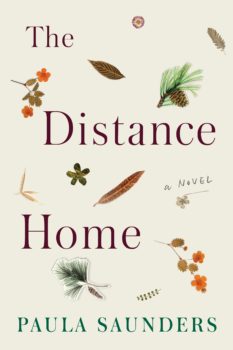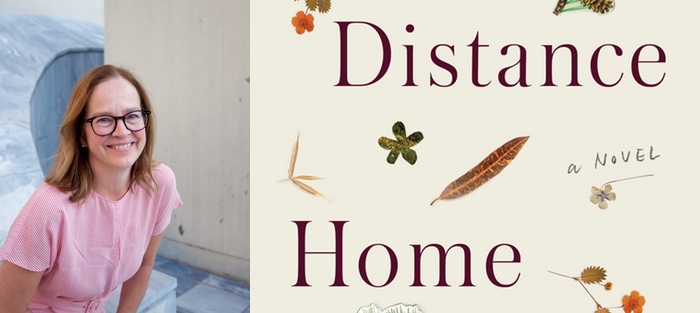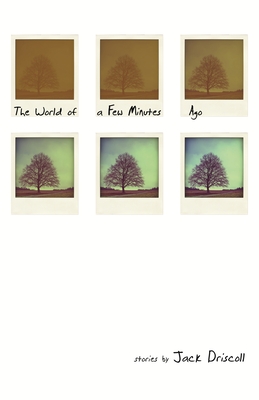Editor’s Note: For the first several months of 2022, we’ll be celebrating some of our favorite work from the last fourteen years in a series of “From the Archives” posts.
In today’s feature, Steven Wingate talks with Paula Saunders about the state of our cultural “mindscape,” how desires become embedded in our psyches, and the influences that shape her work. This interview was originally published on November 5, 2018.
When I first heard that Paula Saunders’ debut novel, The Distance Home, was set in South Dakota, I knew I had to read it. I’m in my eighth year of living in the state, and I still don’t understand the place. There are a nest of unwritten rules—cultural cues, social mores–that I, someone whose primary geographical influences are New Jersey and Colorado, can’t unravel even when I find myself tangled in them. So I came to the novel hungry, hoping it would teach me something about this place I live yet may never call my own.
But as the adage goes (attributed, perhaps inappropriately, to Anton Chekhov) the role of the artist is to ask questions, not answer them. Saunders’ ambitions extend beyond the region of her novel’s setting and into the identity of America. What reading The Distance Home taught me was a more refined set of questions about how people get subsumed by the place they come from, manage to forge an identity of their own in response to it, or (more likely) arrive at some crooked combination of both.
In the ever-contentious post-WWII baby boom family of cattle dealer Al and his wife Eve, the scales are weighted by circumstance. Middle child René is daddy’s girl, given family encouragement at the expense of first-born son Leon, who is never quite good enough for his father. Despite Eve’s attempts to mold and protect him—which includes fostering Leon’s love of dance—he is never accepted by an increasingly disparaging Al and flails self-destructively through life. While René finds a way out of the family (and out of South Dakota), Leon can only find a way down. Leon is a deeply tragic figure whose slow descent is wrenching to follow as he gets thrown under a metaphorical road-grader that tells American males what manhood is allowed to be, and what it is not.
As Paula Saunders points out in this interview, the forces that shape the lives of René and Leon are not regional in nature. Instead, they are the very DNA of America—“the legacy of conquest,” to borrow a book title from the great Western historian Patricia Nelson Limerick—that we must reckon with if we’re going to look at our nation in the face at all.
Interview:
Steven Wingate: The Distance Home, with its basis in your own personal history, is a classic Bildungsroman. You wrote on Literary Hub that “The material took a long time to brew and settle, and the book took me a long time to write.” Looking back with hindsight, what accounts for your hesitation—and what benefits do you see from taking your time?
Paula Saunders: There were some hesitations, as you mention, early on when I was trying to address this material. I was concerned with protecting my family. I didn’t want to hurt anyone’s feelings just by saying what I had to say—from my own point of view. So I suppose I was somewhat hesitant to move forward with this material for that reason, though I did write many of these same scenes back in graduate school. So I’ve been dealing with this material for a long time and have been interested in it—in family relationships and how they come to shape us – always.
But there are other reasons for the lapse of time, ones that are just as true. My husband and I had two children very soon after graduating from the creative writing program at Syracuse University, and—with no extended family nearby and no money—one of us had to make a living for the family and one of us had to watch the children. So, in this way, moving away from my writing and the material of this book happened by necessity. I didn’t really have the space and time to pursue the lines of thought and the deeper insight I needed to keep going with this material. Maybe the material itself was too close to me, but I didn’t want to indulge in it if I wasn’t going to be able to capture it in a meaningful way.
So there were years when I turned to other things—things I needed to help me develop my own ability to be in a family, to be a beneficial partner in family life. And these were very important years for me. I was beginning to become interested in Tibetan Buddhist meditation practice, and this, along with family life, became consuming for me.
So the great benefit of taking my time and allowing things to flow somewhat naturally from the necessities of daily life was that I had time to really contemplate the relationships that had always troubled me and the situation of each individual in my childhood family without as much anger and resentment—with a little more empathy and open space. And this seemed to offer an opportunity to approach this same material with more open-mindedness and understanding. I do believe this book couldn’t have been written without that element coming into play. That attempt at understanding is, to me, the essential heart of the book.
 I noticed that, unlike so much fiction set in the recent past, you use very few markers of the era in this novel—pop culture references, national events of the day, and the like. For me, that served to accentuate South Dakota’s relative isolation from the rest of America. Was this on your mind, or did you have other aesthetic reasons not to “stitch us in” to the times?
I noticed that, unlike so much fiction set in the recent past, you use very few markers of the era in this novel—pop culture references, national events of the day, and the like. For me, that served to accentuate South Dakota’s relative isolation from the rest of America. Was this on your mind, or did you have other aesthetic reasons not to “stitch us in” to the times?
This question is a really funny one for me, especially because my husband always says I’m like someone from Russia or the Ukraine—I just don’t seem to hold any of the regular cultural references that other people do.
So, I didn’t intentionally exclude any cultural references. It’s just that for me, they didn’t much exist, or weren’t integral to what was necessary to survive growing up. Whether that had something to do with the general isolation of being in South Dakota, or with being caught up in my physical training as a dancer, or with the general stress of daily family life—where I felt I had to pay close and constant attention to what was going on in my immediate surroundings—I couldn’t say. But it seems that each of these may well have contributed to my being generally unaware of the goings-on in the larger world.
My overall feeling is that it likely took a lot of energy just to keep track of what was going on around me at home—to make sure everyone was okay and the day wasn’t going to veer off into territory that felt fraught and unstable.
When people talk about South Dakota they almost always talk about the landscape, which is admittedly spectacular—at least west of the Missouri, with the Black Hills and the Badlands. But what about the South Dakota mindscape? What are its most salient features, and which did you want to make absolutely sure came across in the world your novel creates in the reader’s imagination?
I’m not sure that I can separate the mindset of South Dakotans from that of other Americans. What’s interesting to me in the book is the attempt to look at our general culture “mindscape” and the way it affects all of us—those in middle America, suburban America, even urban America.
It seems to me that we, as Americans, have some idea/ideal in mind, something we’re all trying to catch, and it’s somehow entwined with the competition and hustle of the marketplace, which leads us inevitably to an outsized aggression in everything we do and an underdeveloped sense of empathy and caring for each other. I saw the seeds of this in my own family, which is what led me to write The Distance Home, to try to look at where these ideas come from, where this aggression might be first planted in us and encouraged to grow.
There seems to be a need in the American psyche to “get ahead,” to do the things we have in mind, which of course is not bad in itself; but when this need becomes determinative to the point of turning the main focus of our lives into outdoing each other, besting each other, even when that means stepping over those who need us most, those who can’t get by without our stopping and paying some attention, then it’s a problem. Because we’re all made unhappy by it.
To say this is something specific to South Dakota is undone by looking at the state of our national healthcare. It seems the laws we enact speak most clearly about what is in our hearts. As a country, we don’t seem to care whether our fellow citizens live or die, whether they can afford their medicines or not, whether they live on the street, are addicted to alcohol or opioids. We don’t have the time. We don’t want to spend the money. We have other things to do. Important things. We can’t be held up by those who can’t seem to get their act together and get with the program.
So, to me, this is a national problem. And I think the seeds that allow us to accept these things are planted in our families—in the ways we interact with each other and the things we expect of each other, in what’s rewarded and what’s punished. Because most often we’re rewarded for our strength/success and punished for our weakness/failure. And this accepted dichotomy seems to be a big part of the problem.
There’s another line from your piece in the Literary Hub that stuck with me: “If you’re able to absorb and live this primacy of self—this narrative of vanquishing, conquest, victory, acquisition—you will survive, you will blossom; but if you are unable to learn this kind of lesson… you will suffer at the hands of those who can.” Everyone in The Distance Home struggles with this. You wrote about it as a quintessential American problem, but I’m curious to hear about the specific ways the novel’s landscape (and mindscape) make it manifest.
I think this idea is made manifest in the novel through the juxtaposition of René and Leon. René is naturally aggressive. She wants the spotlight, the attention, and she has enough approval and support in the family to get it. But when she finds that having the spotlight doesn’t really help her, that she’s just as unhappy seeing her brother suffer as she would be if she herself were suffering, she struggles to find a way out.
Leon, on the other hand, ends up seeming both unlucky and naturally despondent. He’s unable to catch his breath from one reeling trauma to the next, and he’s always ready to throw in the towel. He’s not naturally self-protective. He seems to absorb too much of the pain the world throws at him without being able to turn the resultant anger outward against those who have hurt him. Does this remind you of something, this tendency toward constant tenderness regardless of personal cost? For me, this is the most salient feature of our professed Christianity… this kind of losing.
So it seems that in this kind of upside-down world—where strength and power are valued over kindness and tenderness—people who are not naturally self-protective or who refuse to participate in the required aggression will always suffer. And without the protection and guidance of the wider society—as there is really no built-in incentive to care for others—it becomes hard for them to navigate the narrower passages of things like despondency and isolation.
All too often the answer for someone in our culture who is despondent and isolated is only more isolation and despondency through at-the-ready self-soothing addictions to drugs and alcohol, which is what we see in the character of Leon, and which is how he loses all his relationships, including his relationship with his sister and his family, difficult as that may be. He loses the life he might have made for himself, eventually losing his own life, literally, so early, to the effects of what he had hoped would ease his suffering – to alcohol consumption and drug addiction.
René’s older brother Leon is an incredibly poignant character, and he is punished for his unwillingness to perform the particular kind of restrained masculinity that is promoted and clung to in the Great Plains. He is a casualty of a particular kind of machismo that is fundamentally American but has a specific set of rules in the world of your novel. What, if anything, has changed about that performance of masculinity since Leon’s youth?
I had been thinking that things had softened a bit around our preconceived ideas of masculinity, but then came the current political climate, in which the idea of WINNING at all costs has become so blatant and cartoonish that it now seems that any value at all can be sacrificed to it.
The supposedly grown men who are now in power in our country are involved in such outrageous behavior and use such egregious language that we can hardly see them as anything more than spoiled brats or mean little bullies—either bragging about themselves and some harm they’ve inflicted or screaming and hollering and stamping their feet when they don’t get their way.
So I have to admit that I’m discouraged about the state of masculinity in our culture. I’m hoping what we see on the world stage is just a kind of swan song—the death of an era—and that most of us are softening around the edges when it comes to the hard line of defined gender roles. I’m hoping that as this current crop passes from the scene and the younger generation takes over, things will change. But for now, it looks like we’re taking a giant step in exactly the wrong direction–towards more blatant aggression, more abuse of power, more turning away from humanity and our most basic human values, including love and caring, helpfulness, and the ability to listen to and respect each other, especially those who are not like ourselves.
I am lately hit head-on with the idea that where there has been progress there can just as easily, maybe more easily, be degeneration.
René experiences different a kind of punishment: she’s flattened, “taken down a peg” by her peers and even teachers for being ambitious and smart. She’s quite capable of living the “primacy of self” and of meting out punishment to those who can’t. To quote your Literary Hub piece again, she exhibits an “inherited habit of aggression [that] seemed to fester in the Midwest American psyche, turning endlessly to find a target, anything that seemed not quite right, not ‘up to snuff.'” And yet she, too is punished by her community. Could you talk a moment about the ways and means of her punishment?
This is a really interesting question. It is my contention in the book that we all suffer from the aggression that is baked into our culture. So those who do not succeed, do not find a way forward, will suffer; and those who do succeed, who do find a way forward, often at the expense of others, will suffer as well. René can’t be happy and peaceful and content because Leon is not happy and peaceful and content. Because of the harm brought on Leon, René has to find a way to leave her home. There is no peace for her there. So our lives—success or failure aside—are intertwined. We can’t win without everyone winning. If one person loses, we all lose.
These are hard lessons and ones I think we’re in the throes of now, as a culture. Can we be happy, healthy, peaceful when we’re jailing asylum-seekers who are fleeing violence? When we are separating children and babies from their parents? When even after we agree to reunite families we haven’t done the basic work of keeping track of which baby belongs to which adult? It’s unthinkable.
We have followed the line of winning and losing to its ultimate end point—to the blatant and careless throwing away of human life. Can a society that is willing to rend a child from its parent’s arms be a bastion of happiness, peace, and contentment? I think the answer is clear. We cannot be happy while others are suffering. It isn’t possible.
But the story of René has another aspect as well, which is that everybody is in the same fight and on some level everyone knows it. Winning and losing is a zero-sum game; if one person wins, the other loses. So if someone like René starts to excel, the others will do their best to bring her down. Because we all know the cost of being at the bottom, and to keep our places we have to do battle with those who rise, we have to do battle with each other.
Early in your writing life—before that decade-long hiatus, if I have your timeline correct—you had the opportunity to work to work closely with Toni Morrison. In what ways is her thumbprint on this novel, and on you as a writer?
I can only hope that Toni Morrison’s thumbprint is on me as a writer! Though I fear it is too much to ask.
But I do want to say that it has been a great blessing of my life to get to know her and work with her. Her generosity—in looking at and responding with candor and encouragement to the writing I’ve given her over the years—has really been the source of my ability to get back to writing after such a long time. I thank her from the bottom of my heart.
Does writing a novel set in South Dakota change how you feel about the place? Does your fictional imagination still wander there, or has it moved to other locales?
I love South Dakota. I always have. I’ve spent a lot of my life both yearning for it and trying to get away from it. So yes—my imagination still goes there.
I will need to be writing about other places too now, places that are also important to me, like New York City and what it might mean for a South Dakota girl to find herself living in that oh-so-foreign place—on that foreign planet?—at a very young age.
But South Dakota is in my heart. South Dakota will always be my home.







